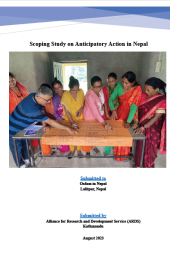Scoping Study on Anticipatory Action in Nepal
Summary
Nepal, with its diverse geography, is highly susceptible to disasters, necessitating the development of anticipatory action strategies. This scoping study on anticipatory action in Nepal revealed gaps in existing policies, particularly regarding cash assistance and anticipatory measures. Bureaucratic challenges, including approval processes and conflicting responsibilities, hinder policy implementation. The Ministry of Home Affairs expresses concerns about cash-based anticipatory action disrupting societal cohesion. Development partners’ approaches vary, with community consultations proving more effective than predictive beneficiary models. Gender disparities in disaster impacts underscore the need for gender-responsive strategies. Recommendations include clear federal guidelines, improved early warning systems, collaboration for funding, and community engagement. Local governments are urged to focus on community-based early warning, while organizations like Oxfam should advocate for technology integration and gender considerations. The study emphasizes the collaborative effort required for Nepal to enhance preparedness and resilience against future threats.
Categories:
Report
Publisher:
ARDS
Published Year:
2023
